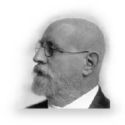Jāzeps Vītols (1863 - 1948)

Jāzeps Vītols is considered a patriarch of Latvian music. He was a great and even legendary personality: the leading figure in Latvian music for more than a half century, a composer, a teacher, a critic, a public figure and an undoubted authority. For more than 30 years as a professor of St. Petersburg Conservatoire Jāzeps Vītols was nurturing the idea about an academic institution for music education in Latvia. Finally in year 1920 the Latvian Conservatoire (now Jāzeps Vītols Latvian Academy of Music) was established. The institution serves the purpose and principles embedded by its founder up to this day.
Life and creativity of Jāzeps Vītols was influenced by trends in the world music to a much higher extent than lives of his contemporaries. Paths of prominent musicians like Nikolai Rimsky-Korsakov, Alexander Glazunov, Anatoly Lyadov, Igor Stravinsky, Sergei Prokofiev, Vincent d’Indy, Karol Szimanovsky, Erkki Melartin crossed Jāzeps Vītols’ way, since he was a member of many international organizations and attended various conferences and meetings.
Faiths in his own talent and in his nation were the main pillars of Jāzeps Vītols’ creative life. The faith was ever present in his compositions and in his life – from a small choir piece to symphonic scores, from a friendly chat with colleagues to representative events of national importance. Creativity was the essence of Jāzeps Vītols’ personality. His music is clear, deep and humane; the composer was striving for harmony, an opinion of a rich and complete personality on a human being and on the world shines through the musical textures.
The creative spirit of Vītols lives on through everyday life as well as celebrations. Nowadays, after regaining of the national independence, more than ever the art of Jāzeps Vītols crosses the borders – international audiences are attracted by Jāzeps Vītols competition for pianists and singers. The attraction has a well founded reason – the music by Vītols is not a museum exhibit; it is a real and live musical art even in the beginning of the 21st century.
Prof. emer., Dr. habil.art. Jānis Torgāns

